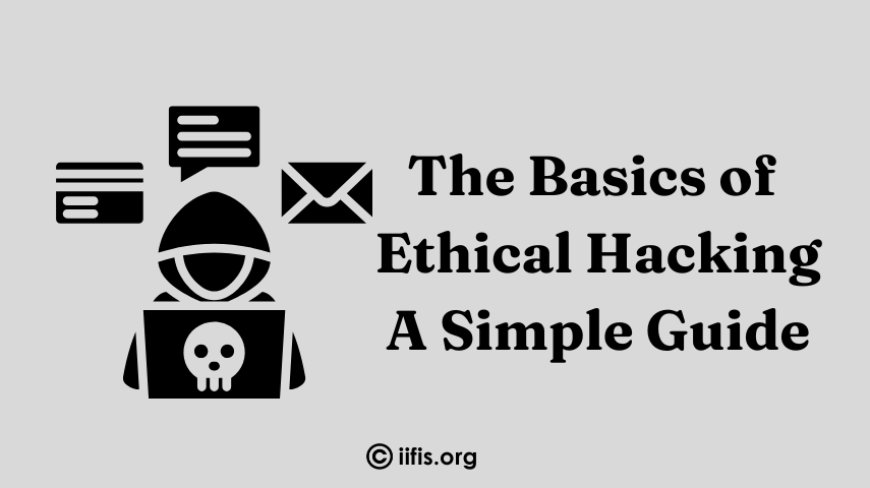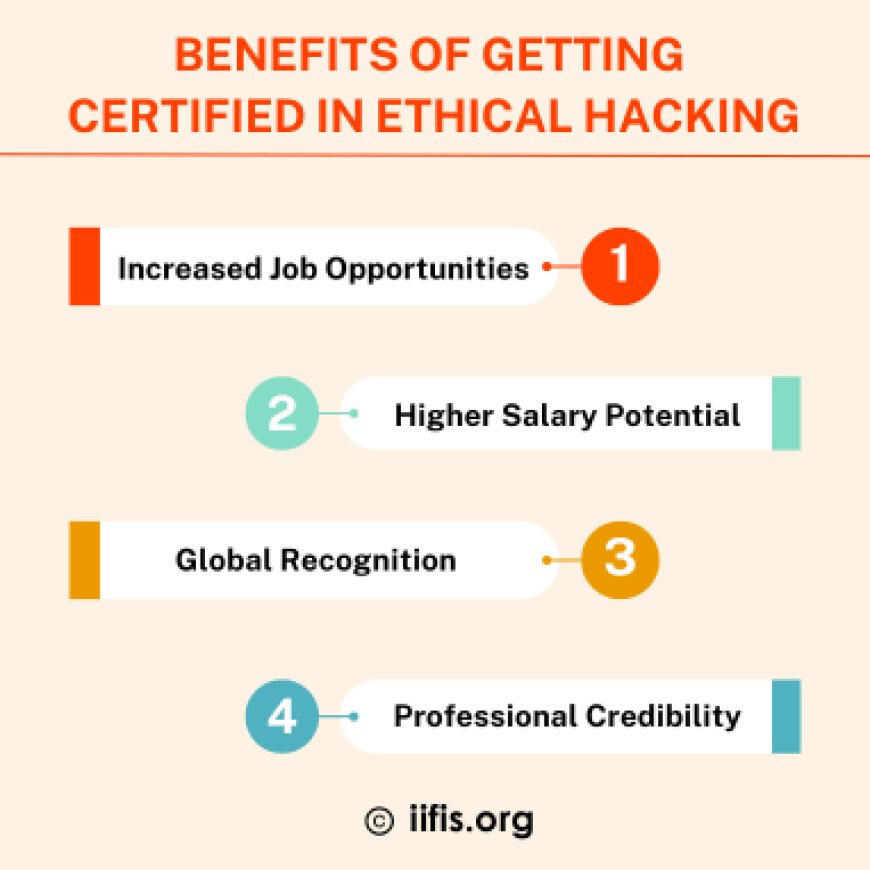The Basics of Ethical Hacking: A Simple Guide
Learn the fundamentals of ethical hacking with this simple guide, covering essential techniques, tools, and best practices for protecting systems and data.

What is ethical hacking?
Ethical hacking is all about helping organizations stay safe in digital mediums. It involves skilled professionals, known as ethical hackers or penetration testers, who intentionally look into computer systems, networks, and applications to find security weaknesses before bad actors can take advantage of them. These experts use the same tools and techniques that attackers might use, but they do it with permission from the organization. Their main goal is to improve security measures, protect sensitive information, and meet industry regulations. By simulating real-world attacks, ethical hackers help organizations build stronger defenses and reduce potential risks, ensuring a safer online environment for everyone.
Why is ethical hacking important?
- Identifying weaknesses: Ethical hackers play a crucial role in spotting weaknesses in systems before attackers can take advantage of them. This active approach helps organizations stay one step ahead.
- Preventing Data Breaches: By fixing these issues, businesses can safeguard sensitive information, keeping it out of the hands of cybercriminals. This not only protects the company but also its customers.
- Building Trust: When companies invest in security measures, they show their customers that they care about their safety. This commitment helps build trust and maintain a strong reputation in the market.
- Compliance: Many industries have regulations that require regular security assessments. Ethical hacking helps organizations meet these standards, ensuring they’re not only secure but also compliant with the law.
Key skills for ethical hackers
Networking Knowledge: Understanding how networks work is essential for any ethical hacker. It’s like knowing the layout of a building before you can safely navigate it. A solid power of concepts such as IP addressing, firewalls, and VPNs will help you identify weaknesses and secure networks effectively.
Programming Skills: Being familiar with programming languages like Python, Java, or C++ can give you a significant edge. Programming allows you to write scripts to automate tasks or even develop your security tools. Think of it as having the ability to create your own set of keys to unlock different doors in the digital world.
Operating Systems: Knowledge of various operating systems, especially Linux, is crucial. Many security tools run on Linux, and understanding its environment will help you test systems more effectively. It’s like being comfortable in different terrains—whether you’re in a Windows world or navigating Linux.
Security Tools: Proficiency with security tools such as Wireshark, Metasploit, and Nmap is a must. These tools are your companions in the field, helping you analyze traffic and map out networks. Being skilled with these tools means you can efficiently identify weaknesses and suggest ways to strengthen defenses.
Additional Skills to Consider
Problem-Solving Skills: Ethical hacking often requires creative thinking and problem-solving. You need to approach challenges from different angles to find solutions and uncover weaknesses. It’s about being a digital detective, piecing together clues to protect systems.
Attention to Detail: An observation in detail can make all the difference. Small differences can lead to significant changes, so being careful in your work is essential. It’s like examining a painting—everything matters in understanding the whole picture.
Communication Skills: strong communication skills are important. You’ll need to explain complex technical issues to non-technical stakeholders. Being able to clearly state your findings and recommendations will help bridge the gap between technical and non-technical teams.
Getting Started with Ethical Hacking
1. Learn the Basics: Begin your journey by diving into the fundamentals of cybersecurity. You can find plenty of online courses or read books that straightforwardly explain key concepts. This foundational knowledge will help you understand how different systems work and what you need to look out for.
2. Practice: Once you’ve gained the basics, it’s time to put your knowledge to the test. Platforms like Hack The Box and TryHackMe offer safe environments where you can practice your skills. Think of it as a virtual playground for hackers, where you can try out different techniques without any real-world consequences.
3. Get Certified: To take your skills to the next level, consider pursuing certifications like the Certified Ethical Hacker or Offensive Security Certified Professional (OSCP). Additionally, you might explore certifications from the International Institute for Information Security (IIFIS), which offers a range of options for ethical hacking and cybersecurity. These credentials not only validate your skills but also make you more attractive to potential employers. It’s like earning a badge that shows you’re serious about your career.
4. Join a community: Get connected with fellow learners, and professionals can provide valuable support and resources. Look for online forums, local meetups, or social media groups where you can share experiences, ask questions, and learn from others in the field. Being part of a community can make your learning experience more enjoyable and enriching.

The Future of Ethical Hacking
The future of ethical hacking looks bright and ever-changing, shaped by technological advancements and the growing complexity of cyber threats. Here are some key trends that will guide its evolution:
Increased Demand: As cyber threats become more intelligent and frequent, the need for skilled ethical hackers will continue to soar. Organizations across various sectors—like finance, healthcare, and retail—are actively seeking professionals who can safeguard their systems from potential breaches. If you’re considering a career in this field, it’s a great time to get started.
Emergence of AI and Automation: Ethical hackers will increasingly use artificial intelligence (AI) and machine learning to enhance their testing processes. Imagine having automated tools that can quickly identify vulnerabilities, allowing you to focus on solving more complex security challenges. This shift not only makes the job more efficient but also allows ethical hackers to stay one step ahead of cybercriminals.
Focus on IoT Security: With the rise of the Internet of Things (IoT), ethical hackers will be crucial in securing a wide range of connected devices, from smart home gadgets to industrial machinery. As these devices become part of our everyday lives, addressing their weaknesses will be essential. Ethical hackers will need to develop strategies to protect these devices from being exploited.
Regulatory Changes: As data protection laws tighten around the world, organizations will prioritize compliance with these regulations. Ethical hackers will play a key role in helping businesses navigate these complex requirements, ensuring that security assessments are conducted and vulnerabilities are addressed. This aspect of the job will be increasingly important as organizations face legal consequences for data breaches.
Emphasis on Continuous Learning: The cybersecurity landscape is always evolving, so ethical hackers must stay current with the latest trends, tools, and techniques. This means committing to continuous learning and professional development, whether through online courses, workshops, or industry conferences. Staying informed will be vital for success in this dynamic field.
Collaboration with Other Fields: Ethical hackers will increasingly collaborate with professionals from other domains, such as data scientists and software developers. This teamwork will be essential for creating secure systems from the ground up. By working together, these professionals can ensure that security is integrated into the design process, making systems more susceptible to threats.
Future Jobs in Ethical Hacking
Penetration Tester: These professionals simulate attacks on systems to identify weaknesses. They are crucial for testing the security measures of organizations.
Security Analyst: Security analysts monitor and analyze security systems and incidents, helping organizations respond to threats and enhance their security posture.
Security Consultant: Consultants assess a company’s security measures and provide recommendations for improvements. They often work on a project basis with multiple clients.
Cloud Security Specialist: With the rise of cloud computing, experts in securing cloud environments will be in high demand to protect sensitive data stored online.
IoT Security Specialist: As more devices become interconnected, professionals focusing on securing IoT devices and networks will play a vital role in mitigating risks associated with these technologies.
Incident Responder: These specialists are responsible for addressing and mitigating security incidents, ensuring that organizations can quickly recover from attacks.
Cybersecurity Researcher: Researchers analyze new threats and weaknesses, contributing to the development of advanced security tools and strategies.
Ethical Hacking Trainer: As more individuals seek to enter the field, experienced ethical hackers can find opportunities in teaching and mentoring aspiring professionals.
Compliance Officer: Professionals in this role ensure that organizations adhere to relevant cybersecurity regulations and standards, often working closely with ethical hackers to assess risks.
Chief Information Security Officer (CISO): In leadership roles, CISOs oversee an organization’s entire cybersecurity strategy, including ethical hacking initiatives.
The role of ethical hacking in cybersecurity will only become more critical. With the increasing complexity of cyber threats, organizations need skilled professionals who can proactively identify and rectify weaknesses. Pursuing a career in ethical hacking not only offers exciting opportunities but also allows individuals to contribute significantly to the safety of digital environments.
Earning certifications like those from the International Institute of Finance and Information Security (IIFIS) can enhance your qualifications and credibility in this field. These certifications provide comprehensive training in ethical hacking, cybersecurity, and risk management, equipping professionals with the knowledge and skills needed to tackle modern security challenges effectively.
These certifications cover essential topics, including penetration testing, threat analysis, and incident response, ensuring that you are well-prepared for various cybersecurity roles. By obtaining IIFIS certifications, you can demonstrate your commitment to staying updated with industry standards and best practices. In a world where cybersecurity is paramount, being certified not only boosts your career prospects but also positions you as a trusted expert in safeguarding vital information. Embrace the future of ethical hacking and take the first step toward making a real impact in cybersecurity.
























